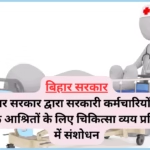The new guidelines introduced by the state administration are an important step towards improving healthcare services government and private hospitals. As a result, the admission and medical processes in government and private hospitals will become more organized and clear. This will provide patients with high quality treatment, timely healthcare services, and greater financial benefits. The aim of these guidelines is to make medical facilities more efficient and inclusive so that patients can receive timely and high-quality treatment. Under this decision, the same-day admission and discharge processes have also been given special attention.
Importance of in-patient treatment
In-patient treatment is a process in which a patient has to be admitted to the hospital due to a serious health condition. Under this, the patient is given proper care and services of specialist doctors in the hospital.
The government has set new rules to bring clarity and convenience in the processes related to in-patient treatment in government and private hospitals.
Key points of the new guidelines
The new guidelines published by the state government include the following key points:
- Equal treatment in government and private hospitals: It has been ensured that patients receive equal health services at government and private health centers.
- Special facilities for economically weaker sections: For those who are financially weak, medical services will be available free of cost or at a reduced rate under the government schemes.
- Timely medical management: New rules have been made to speed up the process of admission and discharge, so that more and more people can get its benefit.
- Emergency medical service: Hospitals have been directed not to delay emergency medical services in any way and simplify the admission processes.
- Inclusion of insurance schemes: The government has directed that hospitals associated with health insurance schemes will have to provide proper treatment to the patients.
- Technical monitoring and data management: Information related to the treatment, admission, and discharge of patients will be stored digitally, so that health schemes can be improved in future.
One-day admission and discharge process
For certain diseases and surgeries, patients are admitted to hospitals for a few hours or a day. To make this process transparent and systematic, the government has taken the following steps:
- Hospitals have been asked to expedite the process of admission and discharge of patients.
- Patients in critical condition will be given priority so that they can get proper medical treatment quickly.
- The decision of discharge will be taken based on the condition of the patient.
- Post-discharge care will be arranged so that patients can get proper care at home as well.
Functions of Government Hospitals
Government hospitals have been asked to follow the following responsibilities:
- Improve the quality of medical facilities.
- Make all health services available and simple for the people.
- Strengthen online appointment and helpline services for the convenience of patients.
- Provide proper benefits to government schemes and insurance holders.
Guidelines for private hospitals
Private hospitals will also have to improve their service according to these rules. The government has given the following instructions:
- Provide medical treatment to the beneficiaries of government schemes without any discrimination.
- Avoid overcharging and follow the rates fixed by the government.
- Maintain clarity in the admission and discharge processes.
- Make the helpline and complaint redressal mechanism for patients effective.
Goal of Healthcare on Same Day
The state government may have thought that by having different officials and personnel performing day care procedures on the same day, the management of healthcare services can be improved. The reasons for this could be as follows:
- Time savings: Providing medical services on a particular day for personnel has less impact on their office hours. They can get treatment quickly and return to work the next day.
- Better use of resources: Treating multiple patients at a time in public and private hospitals can lead to better use of resources, such as operation theatres, doctors, and equipment.
- Cost control: Performing multiple procedures on a single day can reduce government and personnel expenses, as special agreements can be made with hospitals.
- Health inspection: Having medical treatment on a fixed date makes it easier for the government to evaluate the health status of its personnel.
Expected benefits of the new policy
These new instructions issued by the government will have many important benefits:
- High quality medical service: Patients will get better medical services.
- Financial help: Poor and middle class families will get health services at low cost.
- Clarity in processes: Admission and discharge processes will become more systematic and transparent.
- Accessibility of healthcare: Government and private healthcare facilities will become more effective and easily accessible.



